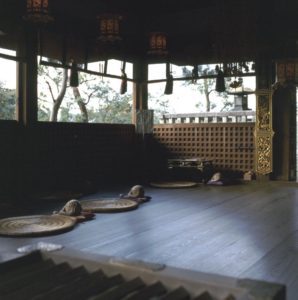How to fit hours of meditation into your working day
The spiritual teachings and meditation entered my life in a life-changing way while I was living in Japan.
Yet, after just a few months, I found I was using most of my energy for work and commuting. I was struggling to find time to sit in meditation. Often, I had to start work across Tokyo at 7:30 or 8 am. On those days, I was skipping my morning meditation then feeling too tired to sit at night.
Suddenly, my newfound passion for meditation seemed confined to a few hours a week. How could I make it more of a priority when I needed the paychecks, more than ever, to do retreats?
Then the way found me.
A new perspective
My second job–writing passages for the national English examinations in Japan–was one reason I was so busy.
The new perspective came when a spiritual friend pointed out that this job was an opportunity. Through my writing, I could share with others the spiritual learning that I was benefiting from.
This didn’t immediately grab me. Mainly, the examinations avoided spiritual topics in particular, along with any other potentially controversial ones.
But then I realized that if I changed my approach to what I was writing, I could subtly change what I was putting out there, to the millions of readers across the country.
More importantly, I realized that because I wasn’t using this job as part of the spiritual practice now so important to me, there was actually an increasing feeling of separation and dissatisfaction at work.
A new approach
So I began to write with a different motivation, and suddenly the work was no longer work–it was a kind of meditation. For example, instead of just researching “suitable” topics, I would now look for topics that demonstrated compassion, wisdom, or generosity.
After that, my mind didn’t get caught up so much in the daily frustrations of finding new topics or choosing the right information to use. Because my main intention was different.
My focus was now finding the most enlightened view in any aspect of a situation I was writing. Now I was working much less on autopilot, and consciously keeping in mind principles such as compassion and joy, and putting them back out into the world whenever I could.
By shifting the focus to something bigger than myself or my role, I’d found a way to make this work into a practical and active meditation tool. I was practicing patience and discerning wisdom, being more mindful about every word, and ending up in a better space at the end of the day.
I didn’t know it at the time, but I’d turned this job into Karma Yoga (mindful service) and that’s why it was giving me energy, instead of draining it.
Too busy to practice? There are ways to make your day into your practice
At Clear Sky, we begin our mornings by choosing a contemplation for the day. The contemplation sets up an intentional learning, to watch the mind during Karma Yoga activities.
You can do this yourself, too. Whether you’re a student, self-employed or work away from home, you can set up your day as an intentional meditation.
One way to make your daily work into a practice

1) Choose a contemplation
Instead of going through your day as you normally would, dedicate the day to looking at a particular question. It just takes a few minutes to reframe your day.
It could be something like one of these:
- ‘How can I bring more joy into my day, for myself and others?’
- ‘How can I be more compassionate at work?’
- ‘How can I make my communication more conscious’?
or one of these:
- ‘Who do I avoid talking to?’
- ‘What do I tend to put off?’
- ‘Where do I tend to overreact or get defensive?’
Or, you can work your way through the Paramis or the Eightfold Noble Path, and look for ways to bring these qualities into your life more as your contemplation.
2) Carry it with you
Then carry this question into your day, in the background of whatever you’re doing.
You may need to set a timer to remind yourself to check in on the question. Or perhaps recall it every time you do a certain action such as opening a door or when changing tasks.
3) Review the day
Have you ever finished your day reviewing conversations you should have had? Going over things that went wrong, or what you didn’t get done, obsessing over something that person said or did?
This is where the benefits of making your day into a spiritual exploration really show.
Now you’ve focused energy on this contemplation, not just the regular details of your day, the review of your day can look a lot different.
Give yourself a few minutes to write down anything that came up in the day related to your question. Look for patterns and insights, and avoid getting caught in judging or questioning what happened.
Then go deeper with your notes. Ask yourself ‘why’ questions. Question your assumptions. Look for views that aren’t really working for you.
4) Share the merit
This reminds us that our spiritual work affects and benefits everyone else. Doing this, whether they know it or not, has had an influence on the people you work with. Sharing the merit also opens us to positive feelings, like gratitude and loving-kindness, even to those that may have been a challenge in our day.
It’s a reminder that this isn’t all about ‘me’.
To share the merit, say either silently or out loud that you want these efforts and insights to benefit everyone you had contact with today, or simply all beings. It’s as simple as that. And then let it all go and move on to your evening.
And…permission to give yourself a break
Whether your day went well or badly, whether you came up with some great insights or completely forgot about the question, give yourself a good pat on the back.
None of that judging yourself if you acted unskillfully, or regretting something you did. Just take it as conscious learning.
The question you chose will keep working away in the depths, because you introduced a little space and freedom, somewhere, by asking the question.
Looking for more tools and support?
If this strikes a chord with you, consider spending time on site at Clear Sky. Check out our three month intensive program.
And please take a look at our full program overview.



